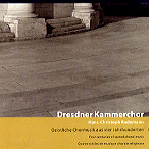Although several of the works performed here are available on numerous other recordings–the Bruckner motets, Martin mass, and Schoenberg’s Friede auf Erden–you’ll never hear them better sung or recorded than by the Dresden Chamber Choir on this second volume of its “Four centuries of sacred choral music”, originally released in the late-1990s. Although there’s something to be said for specialist choirs that concentrate on a specific period, style, or even composer, this extraordinary ensemble shows the virtues of versatility, providing listeners with a wide-ranging mix of repertoire that’s not only compatible but complementary–and always musically involving. Whether the music is 17th-century Schein or 20th-century Martin, these Dresden singers keep one very important thing constant: a rich, vibrant, bottom-to-top tonal balance that keeps intonation sure and harmonies taut. The range of expressive control is notable, from the wide dynamic contrasts of the Bruckner to the delicately articulated, leaping motif in the middle of the Schein. And speaking of control, the final measures of Reger’s Morgengesang show how a world-class choir can turn a cadence into a work of art, a brief moment of breathtaking beauty.
Happily the Dresdeners keep the lid on the Bruckner motets, preserving the balances and allowing unusual clarity in these thick-textured pieces, so often massacred by less-capable, overzealous singers. The results are thrilling, exemplary performances. Another highlight of the disc is Sleep, Fleshly Birth, a madrigal by 17th-century English composer Robert Ramsey. Stylistically the four-and-one-half-minute piece sounds more like one of the more substantial anthems or lamentations by Tallis or Byrd than what we usually think of as a madrigal, and it’s a gem, shining with beautifully drawn lines supported by solid harmonies (with a few pleasant surprises), all of which gives real musical meaning to the somewhat strange text (“Sleep, fleshly birth, in peaceful earth/and let thine ears list to the music of the spheres. . .”). The sound is ideal. And if you like this–and you will–look for the first volume in this set, which includes works by Schütz, Bach, Brahms, and Mendelssohn. Newcomers to this repertoire should be aware that texts are provided in the original language only and no information is given regarding the music or composers. 5/10/2003]
































